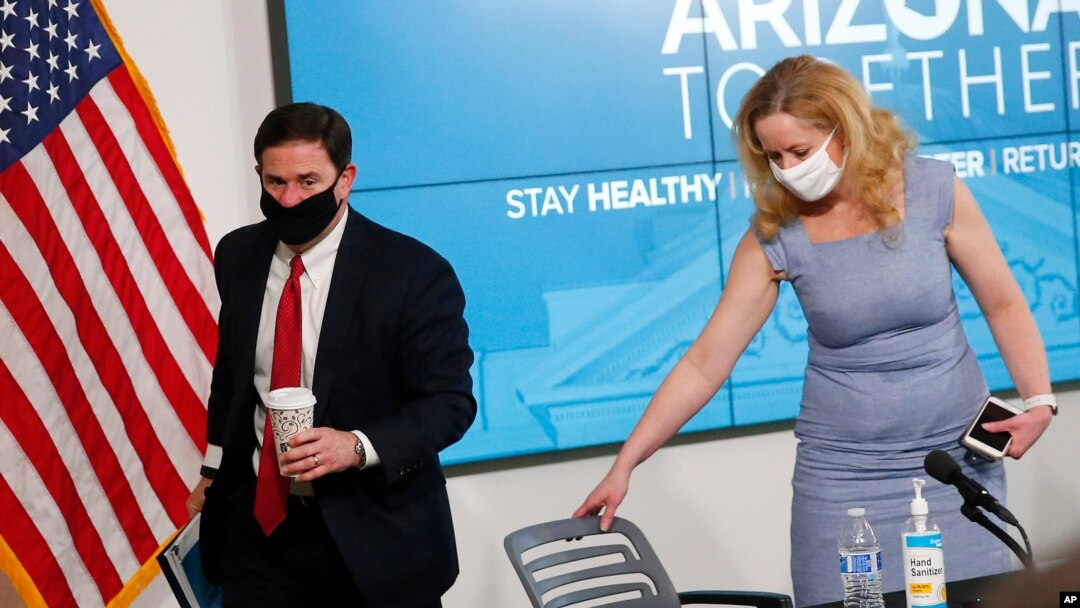Arizona mayors are free to make wearing face masks mandatory to slow the spread of coronavirus, Gov. Doug Ducey said Wednesday, a turnabout amid pressure as the state became a national virus hotspot.
The Republican governor, who entered his weekly virus news conference for the first time wearing a face mask but took it off to speak, said allowing cities to decide would work better than a statewide mandate.
The governor had as recently as last week resisted allowing cities to do more than the state allows to slow the virus spread, saying statewide directives avoid a patchwork of regulations. But he pointed to vastly different county rates of COVID-19 cases and alluded to pushback that some more conservative counties may have to a mandate.
"For some things, a statewide directive or executive order works very well," Ducey said. "If you have 12 or 13 counties that say 'pound sand' on an executive order ... it's a self-defeating executive order."
Mayors in Phoenix, Tucson and Flagstaff said they would move quickly to require masks. Mesa Mayor John Giles tweeted that he will issue a proclamation mandating masks in the city.
Pressure has been mounting for Ducey to act amid the state's alarming rise in cases. Hundreds of Arizona medical professionals urged him to take steps like requiring face masks in public, top Democratic politicians urged him to act and the state's biggest newspaper, The Arizona Republic, also called for action.
Since Ducey allowed the state's stay-at-home and most business-closure orders to expire in mid-May, the second-term governor had taken no new steps to rein in activities like raging bar scenes and the lack of mask-wearing by many in public.
The rising numbers may have forced his hand. Arizona hospitals were treating a record number of coronavirus patients Tuesday amid a surge of new cases. The state's Health Services Department reported a record number of emergency room visits for the virus as well.
The health agency confirmed 1,827 new cases and 20 new deaths Wednesday. That brings the total confirmed cases to 40,924 and deaths to 1,239.
Hospitals were treating 1,582 patients on Tuesday, an increase of more than 500 from two weeks earlier. Emergency room visits for patients with virus symptoms soared to nearly 1,100. On June 3, hospitals reported seeing 638 patients in emergency rooms.
Statewide Tuesday, hospitals were at 85% of capacity. That's well above the 80% rate where Ducey said they would have to halt elective surgeries to preserve space.
Arizona had the most daily new cases in the nation per capita for a seven-day average through Monday and the positive rate of people tested for the virus also topped all other states at nearly 16%. In comparison, New York, once the center of the U.S. outbreak, had a seven-day average positive rate of slightly more than 1%.
A month ago Arizona's rolling average for a week was 3.76 per 100,000 compared with the most recent average of 17.98 per 100,000 people, and the positive testing rate was just 6.5%.
The governor also said he would direct the state to take action against "bad actor" businesses that don't follow guidelines from the U.S. Centers for Disease Control and Prevention and state for social distancing and other measures. The action is aimed at businesses like bars that have allowed large gatherings with few precautions.
And he said he was calling up 300 members of the National Guard to help counties that have struggled with contact tracing for large numbers of new cases. Tracing the contacts of infected people to ensure they're not spreading the virus is a key action needed to slow the virus' spread.
The moves came after more than 700 health providers sent Ducey the letter earlier this week urging him to require that people wear masks in public spaces.
Among them was Dr. Natasha Bhuyan of Phoenix. The family medicine doctor said marketing campaigns and tweets from the governor's office urging the use of masks aren't going to cut it.
"We've been educating the public this entire time, and clearly it hasn't been effective," Bhuyan said. "The accurate scientific information is just not reaching people. It's a public health tenet: When you make things mandatory, you see results."
She said she believes if immediate action isn't taken, Arizona could see hospital ICUs and ventilators reach capacity as early as July.
Ducey has suggested but declined to mandate masks. He posted on Twitter and Facebook Wednesday saying, "Protect yourself. Protect others. Help contain the spread of #COVID19. Wear a mask. #MaskUpAZ."
During a news briefing last week where he pushed back on questions about a mask mandate, the governor insisted that the state's hospitals, while filling up, had the capacity to treat any expected surge.
Those comments drew a rebuke from Sinema in an interview with KTAR on Tuesday.
"I don't think it makes sense to design your policy based on whether or not there are enough hospital beds for people to die in," Sinema said on the "Gaydos and Chad Show."
After Ducey's announcement, Sinema said that lives were at stake and that the actions Ducey took were "a step in the right direction" that allows mayors to act.
"Our public health leaders agree: If Arizona implements widespread testing and tracks infections —and if Arizonans wear masks, keep 6 feet from others, and stay home as much as possible — we can slow the spread of coronavirus in Arizona."
For most people, the new coronavirus causes mild or moderate symptoms, such as fever and cough that clear up in two to three weeks. For some, especially older adults and people with existing health problems, it can cause more severe illness, including pneumonia, and death.
In other developments:
Arizona Governor Says Mayors Allowed to Require Face Masks

Arizona Gov. Doug Ducey leaves wearing a mask after giving an update on COVID-19 in Arizona during a news conference June 17, 2020 in Phoenix.

